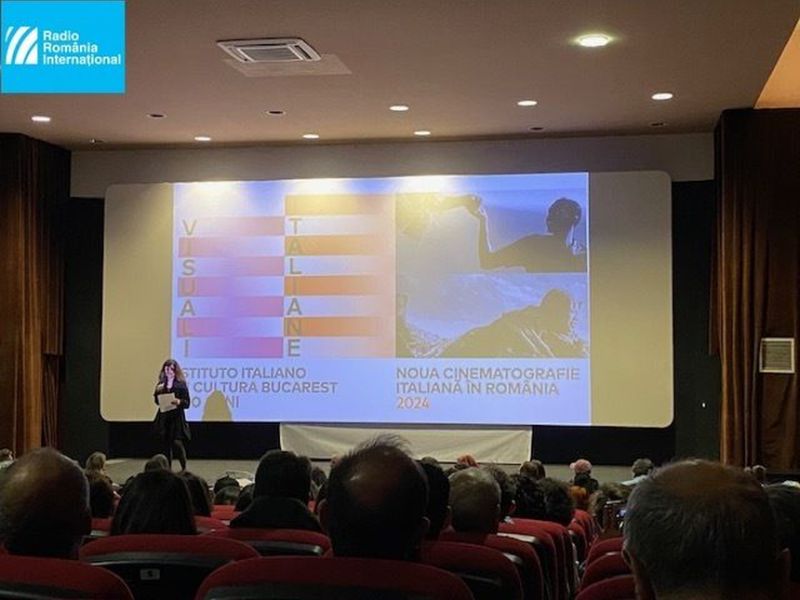Film directors Cristian Mungiu and Bogdan Mirica
Romanian films have this year been well represented in the International Film Festival in Cannes, among which Graduation, which brought Cristian Mungiu the best director award and Bogdan Miricas “Dogs, winner of the FIPRESCI award.
Warning: Trying to access array offset on null in /home/web/rri.ro/public/wp-content/themes/rri/template-parts/content.php on line 53

Warning: Trying to access array offset on null in /home/web/rri.ro/public/wp-content/themes/rri/template-parts/content.php on line 98
Christine Leșcu,
06.08.2016, 14:00
Five Romanian movies were selected to participate in the festivals 17th edition: Cristi Puius feature film “Sieranevada, a début short reel entitled “4:15 P.M. End of the World written and directed by Catalin Rotaru and Gabi Virginia Sarga, “All rivers flow into the sea, a Romanian Film Academy short reel, directed by Alexandru Badea, (running in the Cinefondation section) along with two winning productions, “Graduation, which brought Cristian Mungiu the best director award and Bogdan Miricas “Dogs, winner of the FIPRESCI award in the “Un Certain Regard section.
We recall that Cristian Mungiu has reaped three Cannes awards with his productions. “4 Months, 3 Weeks and 2 Days brought him the Palme dOr award in 2007. Another production signed by him, “Beyond the Hills got Best Screenplay Award and Best Actress Award, which went to Cristina Flutur and Cosmina Stratan in 2012. In 2016 Mungiu shared the Best Director Award with French Olivier Assayas. A well deserved and also honouring award, as was described by Mungiu himself, mainly because the film has been appreciated by the public from abroad and from the Diaspora. As the Romanian director pointed out, “we are more appreciated abroad than in our own country. Director Mungiu confesses that he takes into account public preferences when it comes to choosing the future plots of his films.
Cristian Mungiu: “There is a connection between the things that I am concerned about and those that may have an impact on the public. Out of this mélange I am trying to churn out a film, which is not intended to be a socio-political course, or social discourse, but a cinema production with some action and things that are happening. When I made ‘4 Months, 3 Weeks and 2 Days I wasn’t trying to make a movie that would be critical to communism. I presented only an event that I knew of back then. Its important that people knew they are watching a movie. And if besides emotions that movie is also asking some questions, all the better.
Not only is Mungius latest film, “Graduation or “Baccalaureate raising questions but also touches a sensitive chord with the Romanians: “corruption. Furthermore, the film is in line with Mungius first production “Occident, which he made in 2002, a comedy about the young Romanians dilemma, to stay or to leave the country. “Graduation speaks about those who chose to live in Romania but facing the same dilemma when it comes to their children. But can we speak about a series that was opened by “Occident and closes with “Graduation?
Cristian Mungiu: “I would be happy if this series ended here, but sadly I believe it will remain open and well even pass it to our children. I didn’t expect that 15 years on from ‘Occident wed be at this point now. I hoped things would develop differently but now I have to revisit the issue from a different angle, that of a parent with much more concerns than I had 15 years back. At that time we thought we could change the world for everybody, including parents. Today, when I think how parents should advise children, I realize the progress is not what we wanted and its difficult to give advice or make decisions. So I have revisited this theme, a reason of concern for many parents at my age.
Bogdan Mirica, whose feature film “Dog has been designated by the FIPRESCI jury as the best production running in the “Un Certain Regard section, made his début in 2010 with a film entitled “Junkie. He said he discovered the cinema at the age of 30 when he began to write scripts. But what is the most important part in a film? Its the plot, the script or the directors inspiration?
Bogdan Mirica: “In the case of my film I preferred not to focus on the story very much, because its not very difficult to write a coherent story. I just wanted to experiment with sensations and make a punchy film, but not necessarily through story…through atmosphere, through everything. I wanted it to have an impact, not necessarily supported by the story. That doesn’t mean however the story is sloppy, but that it has some parts missing or uncompleted and its the viewer that could put pieces together.
As a scriptwriter for his own films, Bogdan Mirica admits that a film usually stems from a mélange of feelings, before laying down its concrete blueprint. This is how things happened with his award-winning “Dogs:
Bogdan Mirica: “I begin writing from a feeling, from an emotion, which could be pretty unclear at first, but slowly and gradually things are falling into place and I set out to build a real story around that feeling. In this case its about some memories of my childhood, while I was spending my summer holidays at my grandparents in the countryside. There I witnessed conflicts between locals, and some of them were pretty violent. After years I realized I wasn’t much horrified by violence at that time but by its randomness. I didn’t care very much about the idea of reconstructing that reality, though. The film isn’t a realistic one, characters are almost always talking in riddles and time is unreal. I was told the atmosphere in the film is almost Chekhovian and this how I wanted it to be. And if in the future I get the feeling that all these tricks are becoming obsolete and I need to get rid of them and come closer to reality, Ill probably do that.





























